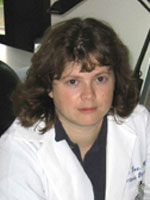
Deborah S. Fox, PhD
Assistant Professor, Pediatrics
Assistant Professor, Microbiology, Immunology and Parasitology
Assistant Professor, Microbiology, Immunology and Parasitology
200 Henry Clay Avenue
New Orleans, LA 70118
Phone: (504) 568-3079
Fax: (504) 894-5379
dfox@chnola-research.org
Degrees
BS - 1990
Purdue University, West Lafayette, IN
MS - 1992
Purdue University, West Lafayette, IN
PhD - 1999
University of Cincinnati College of Medicine, Cincinnati, OH
Bio
Postdoctoral Fellowship, Duke University Medical Center, Durham, NC 1999-2003
Fungal infections are a frequent and growing cause of morbidity and mortality in the ever-increasing organ transplant, cancer, and HIV/AIDS patient populations. In recent years, antifungal drugs that target the enzymes responsible for the synthesis of cell wall components have been developed and are beginning to be used to treat fungal disease. In particular, members of the echinocandin class of antifungal agents are potent inhibitors of cell wall synthesis in many pathogenic fungi. However, they have very low potency against Cryptococcus neoformans, a medically significant fungal pathogen.
To determine the mechanism of echinocandin resistance in this pathogen, we have performed genetic and biochemical analyses designed to identify signaling events that are necessary for cell wall synthesis, with the goal being the identification of protein components of these signaling pathways that may serve as mediators of antifungal resistance in C. neoformans. As a result of these screens, the highly conserved phosphatase calcineurin has been identified as a potential central regulator of cell wall synthesis in this pathogen, as perturbation of calcineurin function renders the fungus exceptionally sensitive to antifungal agents that target this essential process.
We hypothesize that calcineurin plays a central role in the regulation of cell wall integrity in C. neoformans and that components of the calcineurin-dependent cell wall integrity pathway are potential antifungal drug targets. Additionally, we hypothesize that the inherent echinocandin-resistance of C. neoformans is a direct result of fundamental differences in the way cell wall biogenesis is regulated in this organism compared to other fungi and that the identification of additional components of signaling and regulatory complexes involved in cell wall biogenesis will facilitate the elucidation of mechanisms that promote resistance to antifungals that target cell wall synthesis.
We propose to test these hypotheses by determining the influence of calcineurin phosphatase function on the localization and activity of catalytic components of cell wall biogenesis machinery and to identify additional signaling and regulatory elements of these assembly complexes. This information will then be used to examine changes in the protein composition of the cell wall and cell membrane that occur in response to treatment with antifungals that target cell wall synthesis. These studies will allow the identification of key components of cell wall biogenesis machinery in this pathogen and will provide insight into the molecular mechanisms of antifungal drug resistance.
Research Interests
Signal transduction

 myLSUHSC
myLSUHSC